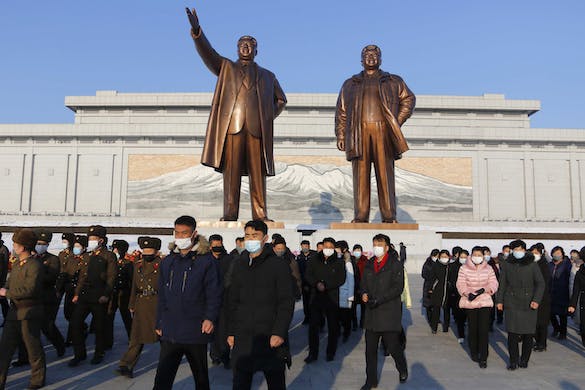Watch for Kim Jong-un’s Next Play Once the Athletes Leave Beijing
Worrisome provocations, including a renewal of nuclear and intercontinental ballistic missile testings, may well resume soon after the Sunday closing ceremony.

Communist North Korea is eyeing its next provocation — likely to come as soon as next week, once the Beijing Olympics end — even as it breathlessly celebrates the birthday of one of its late leaders today.
The most celebrated dates on the country’s calendar are the birthdays of the Communist North’s founder, Kim Il-sung, and of his son, Kim Jong-il. The latter’s 80th was marked with the usual pomp: Fireworks, concerts, and swooning public displays of extreme loyalty to the third scion of the dynasty, Kim Jong-un, the current tyrant, spread throughout the country.
The celebrations follow a recent series of cruise missile launches, including rockets capable of reaching Guam. Significantly, these provocations ceased on the eve of the February 4 Olympics opening ceremony.
Even more worrisome provocations, including a renewal of nuclear and intercontinental ballistic missile testings, may well resume soon after the Sunday closing ceremony marking the end the display of athletic prowess at Beijing, Pyongyang’s main benefactor and patron.
A recent United Nations report concluded that while the North hasn’t tested for more than four years, it has been developing “its capability for production of nuclear fissile materials.”
Pyongyang watchers this week have been scratching heads in attempting to explain a series of recent earthquakes in the northern part of the country, where tremors are rare. At least four such events near the North’s nuclear testing site at Punggye-ri were observed by Seoul.
While America has the tools to detect a nuclear test, and none has registered recently, geologists say a test conducted more than four years ago at Punggye-ri could have resulted in changes in the area’s geology.
That event, in September 2017, was remarkable for Pyongyang’s claim it successfully tested a thermonuclear bomb. Afterward, as part of a series of summits with President Trump, Mr. Kim announced he’d suspend all testing.
Now, Mr. Kim is increasingly signaling he plans to end this self-imposed moratorium. The North’s state-controlled media in January hinted nuclear and long-range missile testing will soon resume. On the other hand, Pyongyang indicates it may continue its freeze if Washington negotiates the easing of sanctions.
Like Beijing, Moscow, Tehran, and practically every other world capital, Pyongyang is watching Washington for signs of weakness as America struggles to react to President Putin’s Ukraine crisis. The Kim regime also keeps an eye on Vienna, where America — with the help of Russia, no less — seeks to renew a failed nuclear deal with Iran.
Mr. Kim seeks “opportunities to create problems to benefit his regime,” says the Foundation for Defense of Democracies’ Pyongyang watcher, David Maxwell. A former Seoul-based Army Special Forces colonel, Mr. Maxwell notes that while Mr. Kim is a perennial “spoiler,” his reliance on Communist China may guide many of his decisions.
Beijing brazenly violates U.N. Security Council-imposed sanctions, and has recently nixed an American-proposed resolution to impose new sanctions on North Korea. Instead, China and Russia proposed a resolution according to which Pyongyang would suspend testing in return for sanction suspension.
Such a “freeze for freeze” resolution would reward the North “for bad behavior,” America’s U.N. ambassador, Linda Thomas-Greenfield, told reporters recently. “There is no reason for this Council to reward them for nine ballistic, nine tests in one month — almost as many in the previous year. They have not earned that.”
President Trump’s “love letter” policies on North Korea, including several summits and an exchange of written messages with Mr. Kim, raised the ante in relations. Now, Mr. Kim refuses any negotiations with Washington other than direct leader-to-leader talks.
On the 2020 campaign trail, President Biden said Mr. Kim is a “thug.” Administration officials now insist that detailed dialogue is possible, but only at a lower level rather than in Trump-style summits.
We “made clear that we are willing to meet with the North Koreans without preconditions,” Ms. Thomas-Greenfield said, “but before we can commit our President to meeting, we need to have a better sense of what there is to achieve.”
While Washington policy makers are consumed with Ukraine, North Korea hands are sidelined, presenting the serial provocateur who runs that country with an opportunity to stun the world by ending his self-imposed testing moratorium with a bang. Or worse.
No one should be surprised if, as early as next week, we wake up to a renewed scare from one of the world’s most dangerous players. Mr. Kim may be the weakest link in the axis he shares with China, Russia, Iran, and others, but he doesn’t like to stay in the shadows for too long.
________
Twitter @bennyavni

